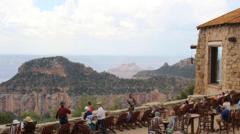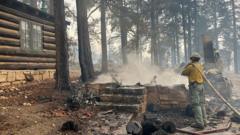Following extensive wildfires across Canada, air quality alerts in Ontario and northern US states warn citizens to limit outdoor activities, with health officials urging caution. The hazardous situation has drawn political attention from both nations, highlighting the increasing challenges posed by climate change.
Air Quality Alerts Endure as Canada and US Grapple with Wildfire Smoke

Air Quality Alerts Endure as Canada and US Grapple with Wildfire Smoke
Smoke from ongoing wildfires prompts health warnings across both Canada and the United States, leading to measures for protecting vulnerable populations.
Air quality alerts have been issued for regions across Canada and northern states in the United States as smoke from rampant wildfires continues to impair air quality. Officials have urged the public to restrict outdoor activities due to dangerous pollution levels. Environment Canada warned that much of Ontario has been affected, with air quality in Toronto ranking among the lowest globally as of Monday.
In the US, authorities have similarly advised residents in Chicago to take precautions until at least Tuesday evening. Vulnerable groups, including infants, the elderly, and individuals with preexisting health conditions, have been especially urged to remain indoors. The situation has escalated to the political realm, with Prime Minister Mark Carney planning discussions with emergency responders in Ottawa.
In Canada, wildfires in Manitoba, Saskatchewan, and northern Ontario have compelled thousands to evacuate their homes. Reports have indicated challenges for many as roughly 30,000 residents faced evacuations in recent months due to severe fire conditions that have resulted in emergency declarations in different provinces.
Moreover, a newly ignited fire on the Bonavista peninsula in Newfoundland has reportedly doubled in size overnight, exacerbating worries about the situation. Climate scientists have continuously linked the growing intensity of wildfire seasons to climate change, with Canada warming at nearly twice the global average—an alarming trend particularly pronounced in Arctic regions.
Political tensions have emerged in response to the crisis, with US lawmakers expressing their grievances to the Canadian ambassador regarding the smoke's impact on American residents' summer activities. This prompted a counter-response from Manitoba's premier, who criticized the US lawmakers for "trivializing" a serious environmental issue. The fires continue to spread, impacting air quality and raising concerns about long-term climate-related challenges for both nations.



















